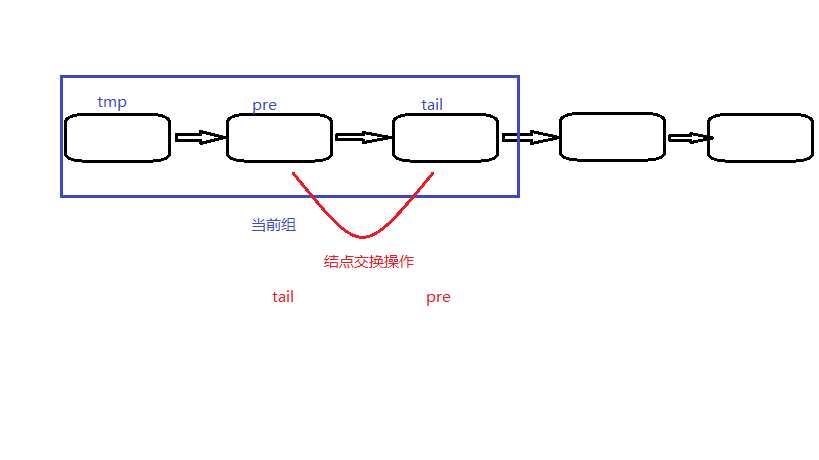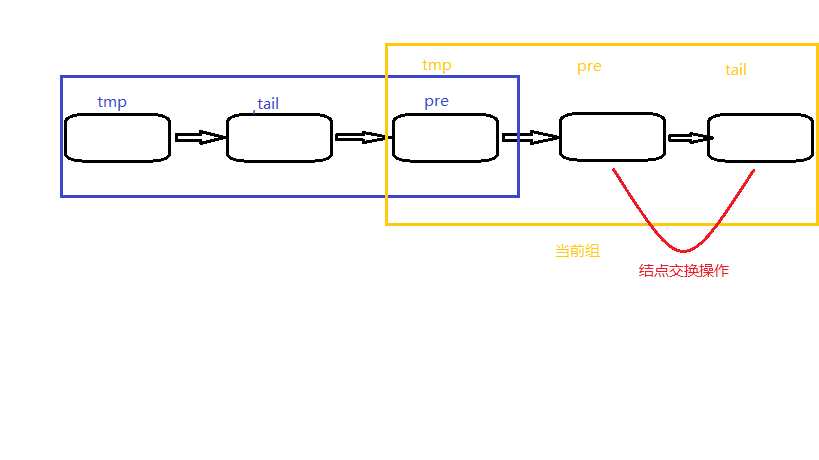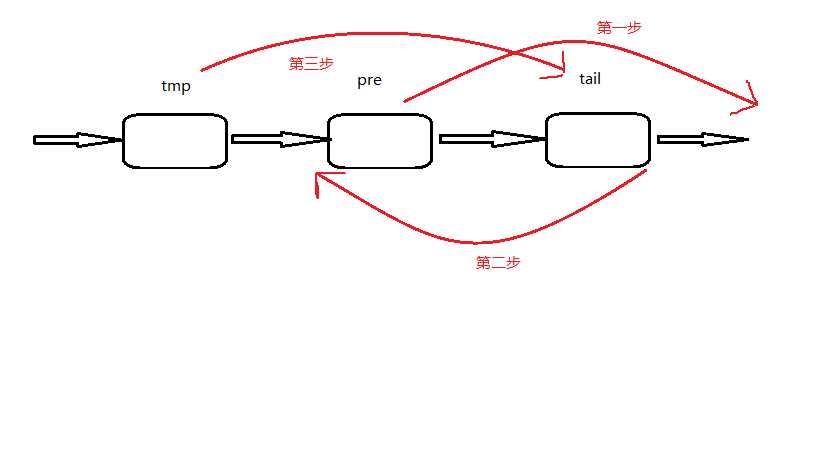标签:mic 作用 info http pair 应该 wap https val
要求摘要:
反转一个单链表
输入: 1->2->3->4->5->NULL
输出: 5->4->3->2->1->NULL
做法是考虑把链表中结点的next指向它的上一个结点,以此来进行反转。
/**
* Definition for singly-linked list.
* struct ListNode {
* int val;
* struct ListNode *next;
* };
*/
struct ListNode* reverseList(struct ListNode* head){
if(head==NULL)
return NULL;
struct ListNode* pre=NULL;
struct ListNode* p=head;
struct ListNode* h=NULL;
while(p)
{
h=p; //h不断变化,最终为反转链表的头结点
struct ListNode* tmp=p->next; //tmp不断指向下一个结点,用于遍历链表
p->next=pre; //将p结点的指针域由指向p的下一个结点,转而指向p的上一个结点
pre=p; //将pre设为当前结点,取下一个结点时,pre即为下一个结点的上一个结点
p=tmp; //即p=p->next,不断取下一个结点
}要求摘要:
给定一个链表,两两交换其中相邻的节点,并返回交换后的链表。
你不能只是单纯的改变节点内部的值,而是需要实际的进行节点交换。
示例:给定 1->2->3->4, 你应该返回 2->1->4->3。
做法:
每一次操作需要知道三个结点,当前结点的上一个结点tmp,当前结点pre,当前结点的下一个结点tail。可以看做每三个结点一组。其中,本组当前结点pre的上一个结点tmp,是上一组的最后一个节点tail,然后对本组的pre和tail进行交换操作。

移动到下一个结点或者说移动到下一组:

具体结点交换操作步骤示意图:

完整代码:
/**
* Definition for singly-linked list.
* struct ListNode {
* int val;
* struct ListNode *next;
* };
*/
truct ListNode* swapPairs(struct ListNode* head){
//如果为空返回NULL;只有一个节点原样返回
if(head==NULL)
return NULL;
if(head->next==NULL)
return head;
struct ListNode* tmp=NULL; //作用是保存一次循环后的末位节点
struct ListNode* pre=head;
struct ListNode* tail=NULL;
tail=head->next; //先进行一次结点交换操作是为了确定头结点
//结点交换
pre->next=tail->next;
tail->next=pre;
head=tail;
tmp=pre; //保存末位节点
pre=pre->next; //当前结点后移,便于下一次操作
if(pre==NULL || pre->next==NULL) //如果链表只有两个或三个结点,返回该链表
return head;
while(pre && pre->next)
{
tail=pre->next;
//结点交换
pre->next=tail->next;
tail->next=pre;
tmp->next=tail;
tmp=pre; //保存末位节点
pre=pre->next;
}
return head;
}另,附上一个很简洁的代码:
ListNode *swapPairs(ListNode *head) {
if (!head) return NULL;
if (!head->next) return head;
ListNode *temp = head->next;
head->next = swapPairs(temp->next);
temp->next = head;
return temp;
}这段代码原帖:https://blog.csdn.net/stay_the_course/article/details/88729356
标签:mic 作用 info http pair 应该 wap https val
原文地址:https://www.cnblogs.com/echobiscuit/p/11111759.html